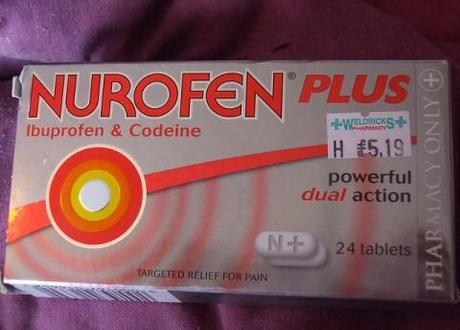
A pack of Nurofen Plus painkillers. Photo credit: incurable hippie http://www.flickr.com/photos/hippie/2357791373/
Thousands of packets of the popular painkiller Nurofen Plus may contain the anti-psychotic drug Seroquel XL, it was revealed this week. Reuters reported that two people have already taken the wrong drugas a result of the as-yet unexplained packaging mix-up.
The Medicines and Healthcare products Regulatory Agency (MHRA) issued an alert, advising people to be extra vigilant, reported The Guardian. Seroquel XL is a prescription-only drug used to treat schizophrenia, mania and bipolar depression. There were suggestions that the mix-up may have been an act of deliberate sabotage.
- How dangerous it this? The NHS responded quickly, posting an update on its Choices blog to try and reassure people. “The blister packs of the two different drugs look different, and should be easily spotted,” said the blog, adding details of how to identify Seroquel XL. The blog went on to describe the possible side effects of Seroquel XL – including “dry mouth, feeling light headed or faint, a fast heart rate, drowsiness, blurred vision” – and advised anyone who thought they may have taken the drug to contact their GP immediately.
- How did it happen? It’s not yet clear how the mix-up happened, but Metro reported that Reckitt Benckiser, maker of Nurofen Plus, “has ruled out a manufacturing error.” Seroquel XL is made by a different company, AstraZeneca, and Reckitt Benckiser said that “serious investigations” were under way into the mix-up. One theory is that there has been a deliberate sabotage. The Telegraph featured further quotes from a Reckitt Benckiser source, who said that “It is very strange. This didn’t happen in the manufacturing. Sabotage is a possibility.” The Daily Mail went further and alleged that “militant activists” might have carried out the “sabotage operation with the intention of damaging Nurofen Plus’s makers, Reckitt Benckiser.” The company “may have been targeted because it tests some products on animals,” the paper suggested.
- What does it mean for the Nurofen brand? PR Experts expressed surprise that Reckitt Benckiser had not acted faster to calm public nerves over the incident. Blogging at The Drum, Jonathan Hemus pointed out that “hours after the MHRA had issued its announcement about the issue, there was no information on the Nurofen website, no information on the Reckitt Benckiser website, no information on the Nurofen Facebook page, no-one manning the consumer helpline.” The danger, Hemus explained, was that with a lack of information “consumers turn to others for advice rather than Nurofen itself, a risky proposition in terms of reputation protection.” PR Week reported that Virgo PR, the firm handling Reckitt Benckiser’s response to the incident, “is ‘not happy’ with The Daily Mail’s line and denies the company uses animal testing.” A Virgo spokesperson said that there was no evidence of sabotage, and added that “if the newspaper has information then it should be helping the company with its investigation.”

